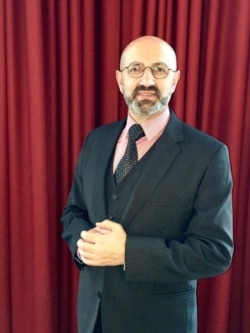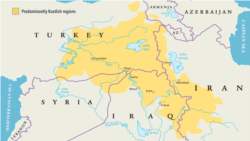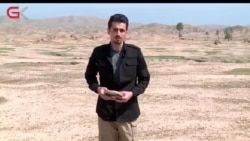The sentencing this month of two journalists in Iran’s Kurdish region underscores the pressures for the region’s media.
Solitary confinement, torture and harsh punishments are an ever-present risk for those reporting on allegations of discrimination against Iran’s Kurdish residents. Even fleeing to nearby Iraqi Kurdistan is no guarantee of safety.
In the case of Sharam Amjadian and Morteza Haq-Bayan, a court in the city of Sanandaj sentenced both to two and half years in prison and 90 lashes for spreading false news.
The conviction is related to a Telegram channel they ran that had nearly 10,000 followers.
The journalists had plans to expand their coverage to include news from other provinces. But their channel, Aamak — a Persian acronym for Explaining the Affairs of the Officials of Kurdistan — was taken offline two years ago when Amjadian and Haq-Bayan were first arrested.
"They had a channel where they published corruption and wrongdoings of government officials in Sanandaj," said Arsalan Yarahmadi, a board member for the Erbil-based nonprofit Hengaw. "They have been sentenced for that reason."
Yarahmadi told VOA that both journalists spent more than two months in solitary confinement.
Their arrests are not an isolated incident. The New York-based Committee to Protect Journalists says that Iranian authorities arrested eight Kurdish journalists amid a broader campaign against political activism last year.
“Iran is in the midst of an autumn for journalism,” said Saleh Nikbakht, a Tehran-based lawyer who has represented several journalists.
Journalism had a “spring” under Iran’s reformist president Mohammad Khatami in the mid-1990s, when media were able to cover cultural and political topics that are now considered taboo, Nikbakht told VOA via a messaging app.
“Journalists in Iran have no freedoms today,” Nikbakht said. “Though there are still some newspapers that print in cities such as Sanandaj, Kermanshah, and Mahabad, these publications don’t have the content that helps inform the public. For the most part, they only write things that the government does not have a problem with.”
Iran's foreign ministry did not respond to VOA's email requesting comment.
Forced to flee
Several journalists have chosen to leave Iran after coming under pressure or arrest. One of those, Hossein Ahmadiniaz, worked as a journalist and lawyer for years before seeking political asylum in the Netherlands in 2018.
Ahmadiniaz was editor-in-chief of the weekly magazine Aso (The Horizon), before authorities forced the publication to close in 2005.
The media outlet had been covering protests over the death of activist Shovan Ghaderi, whom security forces had tied to the back of a truck and dragged through the streets of Mahabad.
"We were critical of the inhumane treatment of Shovan Ghaderi," Ahmadiniaz told VOA. "At that time, social media was not as popular as it is today. Newspapers and magazines were basically the first sources of news for people in Eastern Kurdistan."
Eastern Kurdistan is a term Kurds use to refer to the region in Iran that they view as part of their broader homeland: an area encompassing parts of Iraq, Syria, Turkey and Iran.
Iraqi Kurds have enjoyed political autonomy for nearly three decades, and Syrian Kurds established similar self-rule in recent years thanks to support from the United States and other Western countries. But in Iran and Turkey, Kurds are fighting for greater political and cultural rights.
Iran's harassment of Kurdish media stems from fear about the spillover effects of Kurdish separatism from Iraq and Syria, one analyst said.
"Iran is a very multinational state, with Persians making up barely half the population," said David Romano, an expert on Kurdish nationalism at Missouri State University.
Iran appears to have "an outsized concern and fear of Kurdish dissent,” Romano said, adding that because of that it is not surprising “how repressive and even brutal the regime can be towards Kurdish media and journalists."
Kurds account for about 9% of Iran’s 85 million people, Romano said. A 2019 United Nations report found that they also account for nearly half the total political prisoner population in Iran and that "a disproportionately high number” are given the death penalty.
After Iran closed Aso along with other Kurdish publications including Ashti (Peace), Ahmadiniaz started practicing law, representing Kurdish journalists and political activists.
But he was jailed twice for speaking out against harsh sentences handed down to his clients.
"Kurds as a people are under total and constant surveillance of the Iranian regime," said Ahmadiniaz.
"Iran's Revolutionary Guard Corps is trying to control the Kurdish press through creating its own Kurdish media outlets,” he said, referring to several state-funded websites and TV channels. “Their goal is to prevent the emergence of an independent Kurdish outlet that covers, investigates or writes articles on issues related to Kurdish rights, future and their original culture."
No safe haven
The neighboring Iraqi Kurdistan region has often been a first stop for Iranian dissidents and journalists who flee.
But the region is not entirely safe. Five men last year raided the home of a journalist, whom they beat, and held his wife and children hostage until the reporter agreed to hand over details of sources and dissidents in Iran.
And earlier this month, a senior Kurdish Iranian political official was killed in his hotel room in Erbil by a man whom Iraqi Kurdistan authorities say fled to Iran.
Naaeim Najafi, a 30-year-old journalist who worked for major TV networks including Gali Kurdistan and Kurdistan24, moved to Iraqi Kurdistan in 2014 after being detained and harassed in Iran while editor-in-chief of a student magazine covering Kurdish literature and history.
Even outside the country, the harassment continues with Najafi’s family recently being threatened.
"[Iranian agents] told my family 'if he does not stop his activities, we will return him as a corpse to you,” Najafi said. “These pressures are designed to either silence you or make you work in a way that does not threaten them or reveal the inhumane activities they are involved in throughout the region."
No longer feeling safe in Iraqi Kurdistan, Najafi recently moved to Germany.
"If you are a Kurdish journalist, you are doubly troubled: once for being a journalist and once for being Kurdish,” he said. “This is particularly the case for journalists who talk about the rights of their people and become a voice for their people.”
This story originated in VOA’s Kurdish service.







